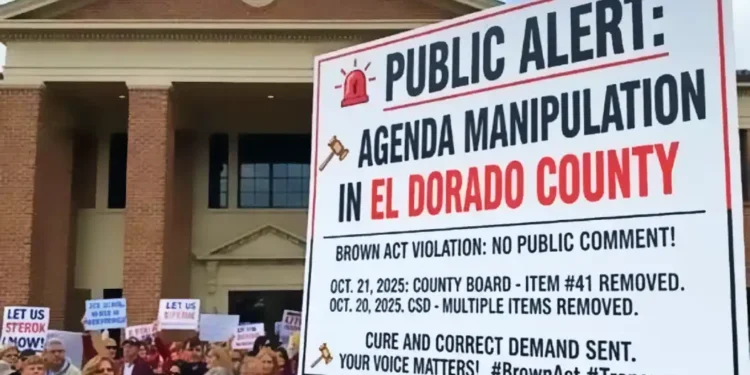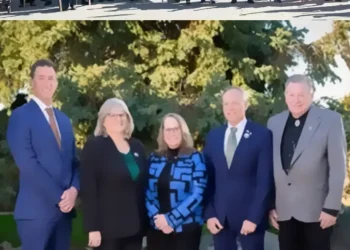By Cris Alarcon, InEDC Writer. (Oct 26, 2025)
EL DORADO COUNTY, Calif. — A formal demand has been submitted to both the El Dorado County Board of Supervisors (BOS) and the El Dorado Hills Community Services District (CSD), alleging that agenda items have been removed without public comment, thereby limiting citizen participation and potentially violating the state’s open-meeting law, the Ralph M. Brown Act (Gov. Code §§ 54950 et seq.).
Key facts & timeline:
-
On Oct. 22, 2025, Dean Getz published a “Cure or Correct” demand letter citing Agenda Item 34 (reference number 25-1824) before the Board of Supervisors titled “Conference with Legal Counsel – Significant Exposure to Litigation pursuant to Government Code Section 54956.9(d)(2).”
-
Getz also alleges that during the BOS meeting of Oct. 21, 2025, Item 41 (a statewide ballot measure) was removed from the agenda under “Adoption of the Agenda” without any public comment allowed.
-
He further asserts that during the CSD’s Oct. 20, 2025 meeting and earlier, multiple items were removed by a 3-1 vote without discussion, thereby denying public speaking opportunities.
-
The demand letter calls for: acknowledgment of the violation, rescission or nullification of the improper agenda actions, and reconsideration of the items at a properly noticed meeting with full public comment access.
Legal and procedural context:
Under the Brown Act, all meetings of legislative bodies of local agencies must be open and public, and all persons must be permitted to attend and speak when the legislative body considers public business. Agencies must provide agendas that enable public participation and cannot on a whim remove items or restrict comment without appropriate notice. The demand letter argues the boards’ actions constitute “agenda manipulation” — controlling what appears on the agenda and when, thereby limiting transparency and public input.
Stakeholders and implications:
Residents, especially in the unincorporated and suburban communities of El Dorado County, may be affected by decisions made behind limited public scrutiny. The BOS, responsible for countywide governance, and the CSD, which provides local services in El Dorado Hills, both bear responsibility for following open-meeting rules. If the demand is upheld, the agencies could face formal proceedings, public trust erosion, and possible litigation.
Voices from the community:
“Controlling the agenda to silence the public is unacceptable,”
Getz states in the demand letter.
In turn, during online discussion, Kirk Smith — an attendee of the Oct. 21 meeting — asserted:
“I was there and I heard people speak on both sides of the question… Where were you?”
Meanwhile, Brian DeBerry responded:
“Kirk, you just cannot give it up, can you? …many people have told me about the meeting. It was only ‘business as usual and the BOS card game.’”
Further, Kelley Nalewaja claimed the item was removed so no one could speak, alleging the mic of one commenter was disconnected and the item later continued to Nov. 4 with unclear comment instructions.
Next steps and what to watch:
The boards now face pressure to respond to the demand. Key indicators to monitor:
-
Whether either board issues a formal acknowledgment of the alleged violation.
-
Whether rescission or nullification of the affected agenda actions is placed on a future agenda with public comment.
-
Whether the items are reconsidered at a properly noticed meeting with public input.
-
Whether any legal challenge or civil action follows.
Residents of El Dorado County should note that open-meeting laws exist to ensure accountability in local government. If an item is removed from an agenda or handled without public comment, citizens have the right to ask questions, request records, and seek confirmation that processes were followed. The Brown Act presentation from the County Clerk’s office offers guidance. El Dorado County










